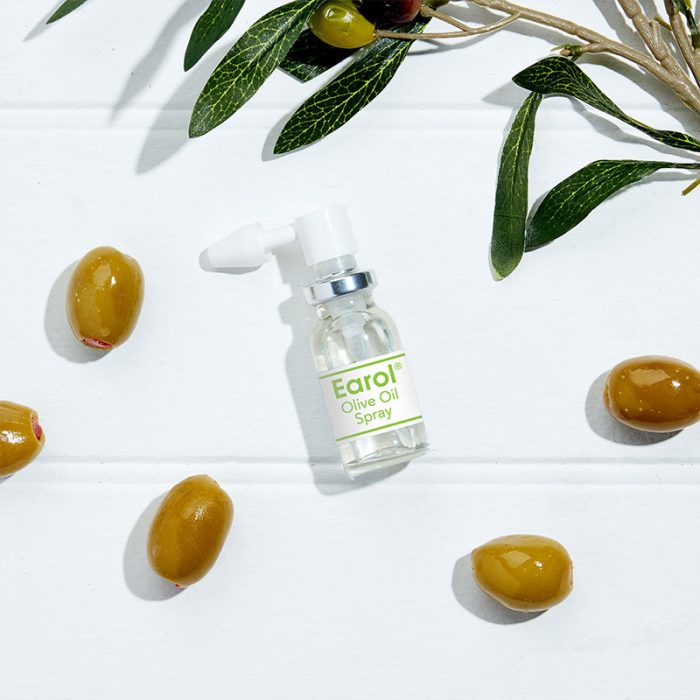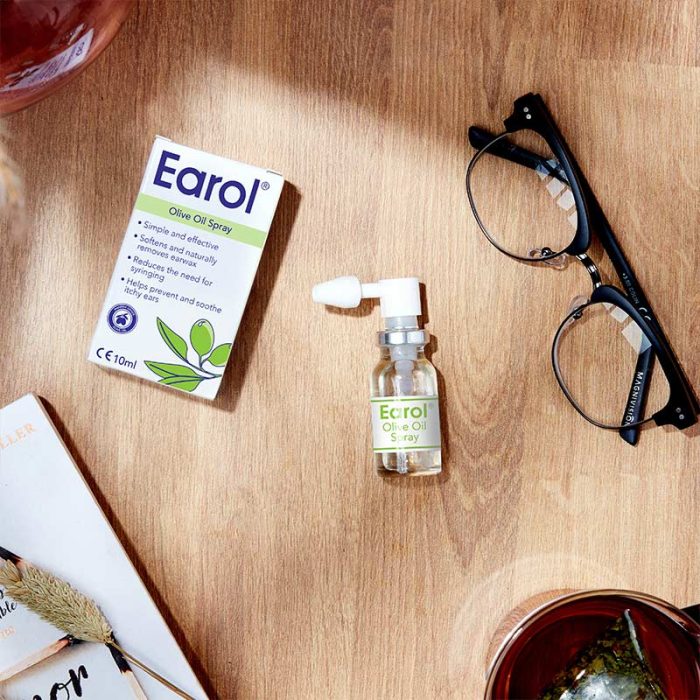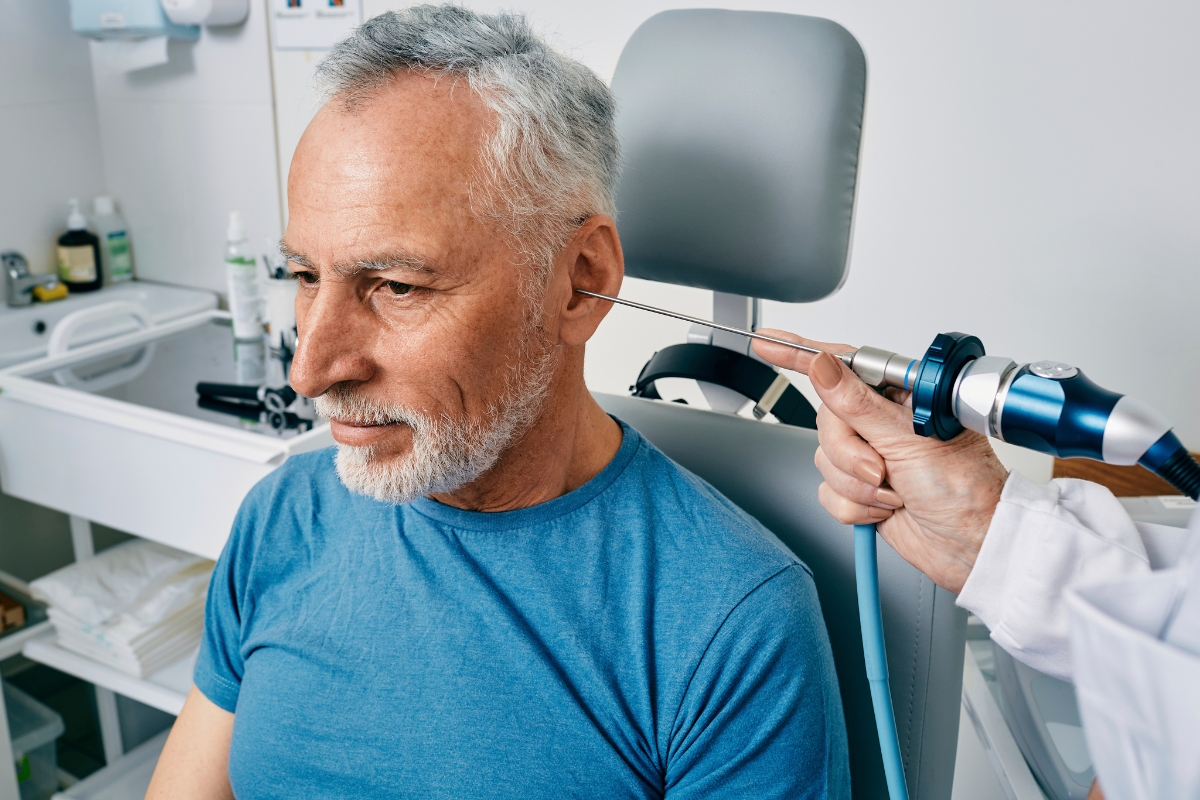Safely Removing Earwax: Olive Oil vs Hydrogen Peroxide
Looking at the possible remedies for earwax buildup, you might be surprised to find some products contain hydrogen peroxide while others, like Earol, are completely effective with no harsh chemicals. Why are the formulations so different, and which really works? In this article, we discuss the differences between using Olive Oil and Hydrogen Peroxide when treating built-up earwax.
Why is Hydrogen Peroxide in some Ear Drops?
Often recommended online, hydrogen peroxide is an ingredient in many brands of over-the-counter earwax treatments, despite the fact that it is often not medically necessary.1 This is because hydrogen peroxide has powerful cerumenolytic effects, meaning it softens cerumen (or earwax) quickly.2 As built-up earwax is often uncomfortable, many people look for an immediate solution to get rid of the buildup as quickly as possible.
When applied to the ear, Hydrogen Peroxide (H2O2) meets an enzyme called catalase in the cerumen, causing it to quickly separate into water (H2O) and oxygen (O2). The release of oxygen atoms causes a fizzing or bubbling sensation inside the ear. It is thought that the bubbles of oxygen soften the earwax, making it easier to remove.3
However, studies suggest that wax may be softened with much milder treatments with a similar effect.4 As hydrogen peroxide is caustic, using it to clean delicate organs such as the ears can be dangerous. It is important to understand the risks when choosing an earwax treatment.
Is It Safe To Put Hydrogen Peroxide In Your Ear?
Your ears are delicate, self-cleaning organs which produce cerumen to keep dust and bacteria away from the inner ear. When too much cerumen is allowed to harden inside the ear canal, there are many available treatments that will soften the wax. Hydrogen peroxide is sometimes recommended, but using this chemical might do more damage than good.
Although it is not as damaging as using cotton buds (a leading cause of earwax buildup2), hydrogen peroxide can cause harm if too much is used or if it is too strong. The potential damage caused by this chemical includes:
- Irritation: the skin of the ear canal and outer ear becomes itchy or sore
- Blistering: fluid collecting under the top layer of skin in itchy or painful sacs.
- Burns: at concentrations of over 10%, hydrogen peroxide can cause painful chemical burns to the skin, these should be rinsed with plenty of running water.
- Inflammation: reddening, swelling, heat and pain in the ears.
- Earaches: damage to the delicate eardrum can cause severe pain in the ear.5
Generally, hydrogen peroxide is considered safe to use at a 3% concentration. Side effects reported include a bitter taste, temporary pain in the ear, temporary hearing loss, dizziness, and tinnitus.6 While there is little research comparing the efficacy of hydrogen peroxide and olive oil in softening earwax buildups1, the potential side effects of hydrogen peroxide suggest that using olive oil carries less risk.

Does Olive Oil Soften Earwax?
As a cerumenolytic, olive oil can soften earwax build-ups, make irrigation easier and prevent future buildups. A review of studies in 2020 found that warm olive oil applied to the ear helped soften earwax better than plain water, prior to a doctor irrigating the ear.7 Many doctors and audiologists now recommend using an olive oil solution in the days leading up to an irrigation appointment to speed up the process.8
Benefits of Using Olive Oil for Ears
Olive oil contains many compounds and vitamins that support health, for the skin, hair and internally. It is credited with the high relative health levels in Mediterranean areas, where olive oil is used widely in cooking and skincare.9 When applied to the ears, these benefits support ear health as well.
- Gentle on the skin: olive oil is used for skin creams and other treatments, so it will not harm the delicate skin of the ear. It can soothe itching or dryness in the ears as well.10
- Anti-Inflammatory11: Olive oil is proven to reduce inflammation, which may be a cause of earwax buildup.12
- Anti-microbial: certain compounds found in olive oil can combat bacteria trapped in the ear, possibly reducing the risk of ear infection.13
Potential risks of using olive oil for ears
It goes without saying that applying olive oil to the ear canal should not be done if you have an allergy to olives or olive oil. Because olive oil is widely used in cooking, skincare and haircare, experts are confident that there are very few side effects in those without an allergy.14
Although it is a popular home remedy, some people find using olive oil to soften earwax difficult. It can be messy, hard to use the correct amount, and some people don’t enjoy the smell. For these reasons, Earol makes this treatment accessible for all by providing odourless pharmaceutical-grade olive oil in a specially-designed, patented spray format. The spray distributes a metered dose evenly into the ear canal so that users are confident they have used the correct amount. Using Earol spray is also much tidier than using olive oil from the kitchen or ear drops.

Comparing Olive Oil vs Hydrogen Peroxide
To look after the ears properly, it is helpful to know the main differences and similarities between common treatments. Aside from being very different substances, olive oil and hydrogen peroxide have different results when used in ears.
Methods
Hydrogen Peroxide is diluted with water and applied to the ears using a dropper. Users apply up to 10 drops, tilting the head for 5 minutes to allow the solution to work its way into the ear canal. As the Hydrogen Peroxide degrades on contact with the cerumen, a fizzing sensation occurs as oxygen bubbles are produced. This process is repeated daily for up to two weeks.
Earol Olive Oil Spray is easy to apply. Insert the spray nozzle into the ear and press the applicator. This releases a precise amount of oil evenly into the ear canal. Massaging the tragus (area in front of the ear) or moving your jaw can help the oil mix with the wax.
In comparison, Earol’s unique delivery system makes using this Olive Oil Spray much simpler and less messy than using hydrogen peroxide.
Risks & Side Effects
While Olive Oil may be an allergen for some people, there are no reported harmful side effects for Earol, nor are there problems with Earol interacting with other medication.14
Compared to Hydrogen Peroxide’s multiple risks, detailed above, it is clear that Earol Olive Oil Spray is a safer choice for the sensitive skin of the ears.
Use Earol Olive Oil Spray for Earwax Removal
After reviewing the key differences between hydrogen peroxide and olive oil, readers may feel confident in choosing a natural, relatively risk-free treatment for earwax buildup. Earol uses a unique delivery system to make sure users get the correct dose, sprayed evenly into the ear canal for full coverage and distribution. While hydrogen peroxide is sometimes recommended online, the balance of facts shows that olive oil is preferable when seeking to soften built-up earwax for wax removal.
You can find more information about Earol Olive Oil Spray and other Earol Products on our website.
References
1 Hand, C., & Harvey, I. (2004). The effectiveness of topical preparations for the treatment of earwax: A systematic review. The British Journal of General Practice, 54(508), 862-867. https://www.ncbi.nlm.nih.gov/pmc/articles/PMC1324923/
2 Frothingham S., Watson K., Sullivan D., Earwax Removal Home Remedies, Healthline, 29 March 23, accessed 24 May 23 at https://www.healthline.com/health/ear-wax-removal-home-remedy
3 Sevy JO, Hohman MH, Singh A. Cerumen Impaction Removal. [Updated 2023 Mar 1]. In: StatPearls [Internet]. Treasure Island (FL): StatPearls Publishing; 2023 Jan-. Available from: https://www.ncbi.nlm.nih.gov/books/NBK448155/
4 Aaron K., Cooper T.E., Warner L., Burton M.J., Ear drops for the removal of ear wax, Cochrane Database of Systematic Reviews, 25 Jul 18, accessed 24 May 23 at https://doi.org/10.1002/14651858.CD012171.pub2
5 Eske J, Chavoustie C.T., What are the risks of too much hydrogen peroxide in ear? In Medical News Today, 8 Dec 20, accessed 24 May 23 at https://www.medicalnewstoday.com/articles/too-much-hydrogen-peroxide-in-ear
6 Alarouj, H., AlObaid, F., AlBader, A. K., & K. Ebrahim, M. A. (2019). A Recurrent Misdiagnosed and Maltreated Case of Keratosis Obturans. Case Reports in Otolaryngology, 2019. https://doi.org/10.1155/2019/9095747
7 Outer ear infection: What helps if earwax builds up? Informed Health [Internet] 13 Feb 23, accessed 24 May 23 at https://www.ncbi.nlm.nih.gov/books/NBK279354/
8 Wrightington, Wigan and Leigh Teaching Hospitals, NHS, Managing ear wax in adults: Patient Information, July 2022, accessed 24 May 23 at https://www.wwl.nhs.uk/media/.leaflets/62d92a2666d699.01744952.pdf, pp.3-8, NICE Guidelines, 2017
9 Aboul-Enein BH, Puddy WC, Bernstein J., Ancel Benjamin Keys (1904-2004): His early works and the legacy of the modern Mediterranean diet. J Med Biogr. 2020;28(3):139-147. doi:10.1177/0967772017727696
10 Madormo C., Carew J., Using Olive Oil for Earwax and Ear Infections in Verywell Health [Internet] 3 May 23, accessed 24 May 23 at https://www.verywellhealth.com/olive-oil-in-ear-5180872
11 Lucas, L., Russell, A., & Keast, R. (2011). Molecular mechanisms of inflammation. Anti-inflammatory benefits of virgin olive oil and the phenolic compound oleocanthal. Current pharmaceutical design, 17(8), 754–768. https://doi.org/10.2174/138161211795428911
12 NHS, Earwax Build-Up, accessed 24 May 23 at https://www.nhs.uk/conditions/earwax-build-up/
13 Servili, M., Esposto, S., Fabiani, R., Urbani, S., Taticchi, A., Mariucci, F., Selvaggini, R., & Montedoro, G. F. (2009). Phenolic compounds in olive oil: antioxidant, health and organoleptic activities according to their chemical structure. Inflammopharmacology, 17(2), 76–84. https://doi.org/10.1007/s10787-008-8014-y
14 HL Healthcare Ltd, Earol Olive Oil Spray: Instructions for Use.
15 Visioli, F., Davalos, A., & Crespo, M. C. (2020). An overview of the pharmacology of olive oil and its active ingredients. British Journal of Pharmacology, 177(6), 1316-1330. https://doi.org/10.1111/bph.14782





